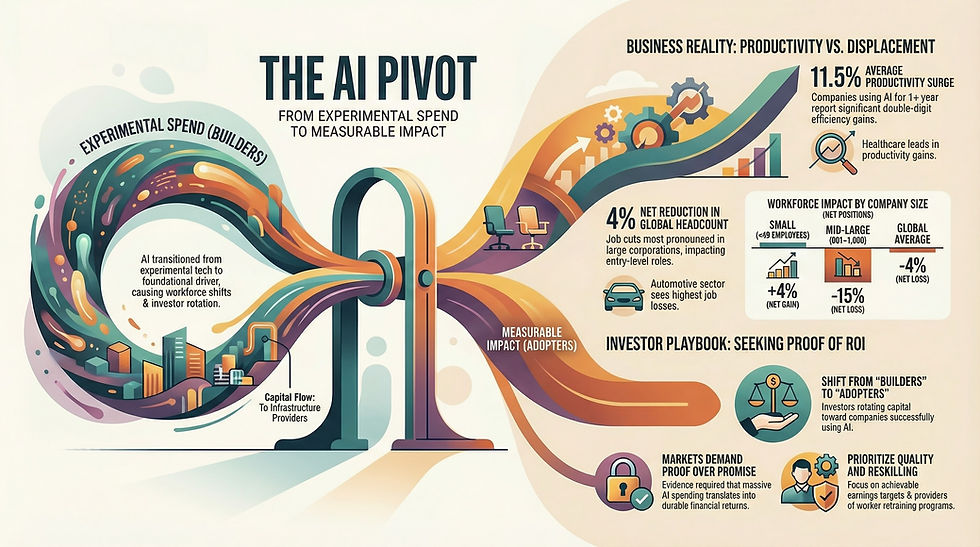From Global Slowdown to ESG Focus: Amundi's 2024 Investment Outlook
- Alpesh Patel
- Mar 19, 2024
- 4 min read
In the ever-evolving landscape of global finance, the "Investment Outlook 2024 - Amundi" document provides a comprehensive guide for investors navigating the complexities of equity investments in the coming year.
Amidst a backdrop of economic, geopolitical, and environmental shifts, the document outlines ten pivotal points that are expected to shape investment strategies in 2024. Here's an expanded look into these insights, offering a deeper understanding for those looking to optimise their investment portfolios.

1. Global Economic Slowdown
The forecast begins with a cautionary note on the global economic slowdown, predominantly led by developed markets. The United States, in particular, is bracing for a mild recession in the first half of 2024, attributed to tight financial conditions that dampen consumption and business sentiment. This slowdown is a critical factor for investors to consider, as it sets the stage for the broader investment climate in 2024.
2. Emerging Markets (EM) Focus
Despite the gloomy global outlook, Emerging Markets (EM) are expected to exhibit resilience, albeit with a degree of fragmentation. Asia stands out, with India and China being earmarked as pivotal for investment flows. This interest is spurred by several factors, including reallocation, near-shoring, supply chain de-risking, and significant transitions such as net zero initiatives and technological transformations. For investors, this signals a strategic pivot towards EM, recognising their potential for growth amidst global uncertainties.
3. Inflation Moderation with Central Bank Vigilance
A silver lining in the economic forecast is the expected moderation of inflation, aligning closer to Central Banks' targets by the year's end. While Developed Markets' Central Banks may adopt a hawkish pause in the first half, Emerging Markets' counterparts could have leeway to reduce rates. This nuanced central bank vigilance suggests a complex interest rate environment that investors must navigate carefully.
4. Green Transition Financing
Fiscal policies are set to prioritise financing the green transition, a move that underscores the growing importance of sustainable investments. The Eurozone, in particular, is accelerating the release of NextGenerationEU funds, with the US and Japan initiating similar measures. For investors, this trend not only highlights the ethical and environmental imperatives but also points to new opportunities in green technologies and infrastructure.
5. Geopolitical Realignment
The document anticipates a year of geopolitical realignment, with countries repositioning to prioritise individual needs and enhance their strategic standing. This realignment benefits nations central to new supply chain routes and those endowed with natural resources. Investors should thus be mindful of the geopolitical shifts, as they could significantly impact market dynamics and investment opportunities.
6. Restored Diversification in Portfolios
With the expectation of low growth and falling inflation, a return to negative bond-equity correlation is anticipated. This scenario is favourable for cross-asset strategies, suggesting that investors may benefit from revisiting diversification principles in their portfolios to mitigate risks and capitalise on potential opportunities.
7. Fixed Income Appeal Amidst Peaking Rates
The allure of the fixed income market is highlighted, especially with yields at their highest in years. For long-term investors, this presents an opportunity to rejuvenate the income-generating capacity of their portfolios. Emphasis is placed on high-quality credit and effective currency exposure management as key strategies for 2024.
8. Equity Strategy - Defensiveness, and Quality Value
In the realm of equities, a strategic inclination towards defensiveness and quality value is advised initially. This approach is recommended until a shift towards cyclical markets/sectors becomes viable as the easing cycle commences. This strategy underscores the importance of cautious optimism in equity investments, balancing risk with potential growth.
9. Emerging Markets Bonds and Equities
A specific focus is recommended on hard currency debt early in the year, transitioning to local currency debt as the Federal Reserve pivot nears. Additionally, an earnings rebound is expected to bolster equities, particularly in Asia. This dual focus on EM bonds and equities reflects a nuanced approach to leveraging the diverse opportunities within Emerging Markets.
10. ESG Investing Focus
Lastly, the document reiterates the centrality of ESG (Environmental, Social, and Governance) investing, with a particular emphasis on the energy transition. Investments in Emerging Markets are expected to accelerate, targeting sectors such as decarbonisation of buildings, food waste reduction, sustainable farming, and transition-boosting technologies. This focus not only aligns with global sustainability goals but also opens avenues for innovative and impactful investments.
In conclusion, the "Investment Outlook 2024 - Amundi" document offers a roadmap for investors aiming to navigate the complexities of the coming year. By understanding and adapting to these ten key points, investors can position themselves to capitalise on emerging opportunities while mitigating risks in a rapidly changing global landscape.
Alpesh Patel OBE
Visit www.alpeshpatel.com/shares for more and see www.alpeshpatel.com/links
Disclaimer: The content provided on this blog is for informational purposes only and does not constitute financial advice. The opinions expressed here are the author's own and do not reflect the views of any associated companies. Investing in financial markets involves risk, including the potential loss of your invested capital. Past performance is not indicative of future results.
You should not invest money that you cannot afford to lose. Mentions of specific securities, investment strategies, or financial products do not constitute an endorsement or recommendation. The author may hold positions in the securities discussed, but these should not be viewed as personalised investment advice.
Readers are encouraged to conduct their own research and seek professional advice before acting on any information provided in this blog. The author is not responsible for any investment decisions made based on the content of this blog.



Comments